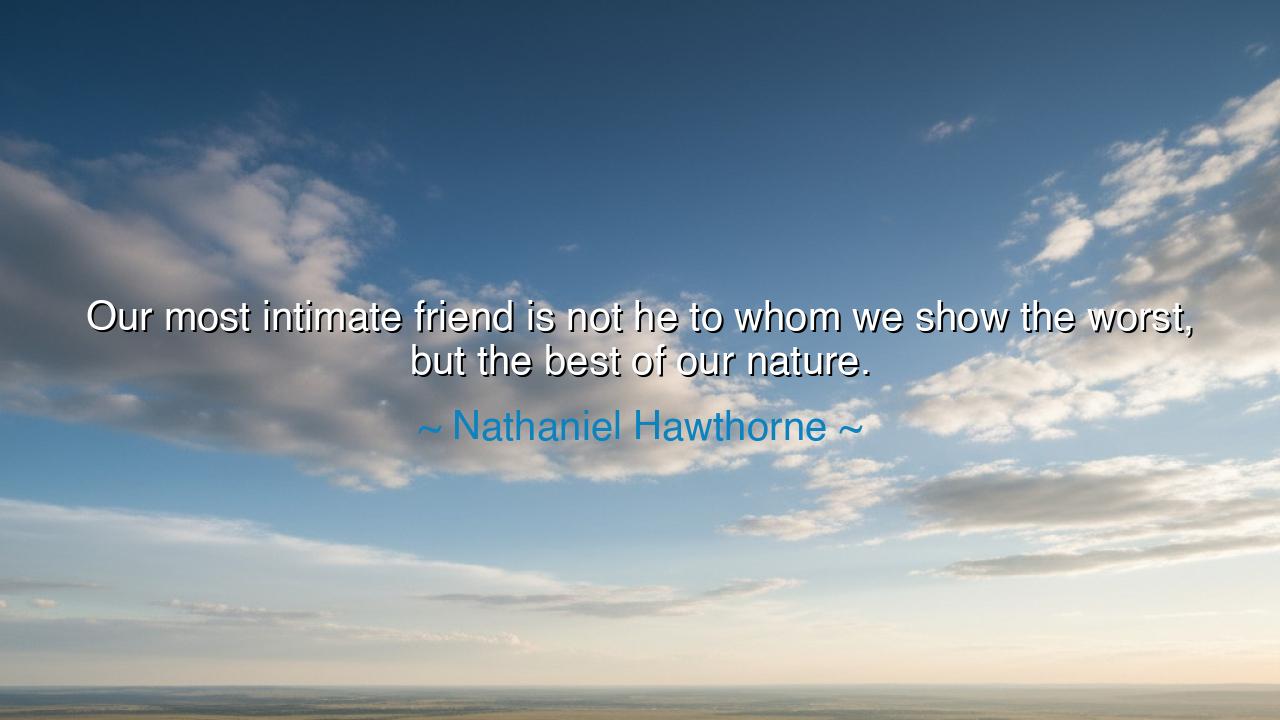
Our most intimate friend is not he to whom we show the worst, but
Our most intimate friend is not he to whom we show the worst, but the best of our nature.






Host: The stillness of the evening settled in, creating a peaceful atmosphere for reflection. Jack sat at the table, his fingers lightly resting on the edge of his cup, reflecting on Nathaniel Hawthorne’s words. Jeeny stood near the window, her gaze turned outward, absorbed in the depth of the quote.
Jeeny: “I’ve been thinking about what Nathaniel Hawthorne said: ‘Our most intimate friend is not he to whom we show the worst, but the best of our nature.’ It’s such an interesting perspective on friendship, isn’t it? The idea that our closest relationships aren’t necessarily formed by vulnerability or weakness, but by sharing our best selves.”
Jack: “Yes, exactly. It’s not that we don’t share our struggles or flaws with our friends—it’s that the deepest friendships are rooted in an appreciation for the good in us, for the parts of ourselves that reflect strength, kindness, and virtue. Hawthorne is suggesting that true intimacy comes from the parts of ourselves we’re most proud of, the best qualities that we want to share with others.”
Jeeny: “Right. What’s so powerful about this quote is that it suggests friendship is not just about support through hardship. It’s also about seeing and celebrating the best parts of each other, about nurturing a connection that’s based on admiration, respect, and mutual growth. The idea that our most intimate friend is someone who sees the best in us—and that’s what strengthens the bond—is really moving.”
Host: The quiet in the room deepened as they reflected on how the nature of true intimacy and friendship often goes beyond shared hardship—it’s about recognizing the strengths, virtues, and positive qualities in one another. Jack’s fingers rested on the table, while Jeeny’s gaze softened, considering how easy it is to fall into the trap of thinking that vulnerability or showing weakness is what builds deep connections.
Jack: “It makes me think about how we sometimes equate intimacy with revealing our flaws or vulnerabilities. And while that’s certainly part of deepening relationships, Hawthorne is showing us that friendship is also about celebrating the parts of ourselves that are strong, good, and worthy of admiration. It’s those qualities that help create a lasting bond, a connection that uplifts both people.”
Jeeny: “Yes, and it’s also about the idea that intimacy doesn’t have to be about always being raw or exposed. True friends appreciate the best in us, even when we’re at our most vulnerable. They see our potential, our kindness, our passions, and they’re drawn to those parts of us. So, when we’re with them, we feel seen, not just in our struggles, but in our fullness, in the best parts of who we are.”
Jack: “Exactly. It’s about recognizing and sharing strength, not just weakness. The best friendships encourage us to be our best selves, to live up to our potential. It’s not about pretending we’re perfect, but about allowing those who are closest to us to see us at our strongest, even when we’re still growing.”
Jeeny: “Yes, and that’s why these kinds of friendships are so powerful. They’re built on a foundation of mutual respect for the best parts of each other. In these relationships, we’re celebrated for who we are at our core, for the good that we contribute to the world. That recognition of our best selves strengthens the bond and helps us become even better versions of ourselves.”
Host: The stillness in the room grew deeper, as they both reflected on the true nature of intimacy—how it isn’t only about sharing our struggles, but also about recognizing and celebrating the best in ourselves and others. Nathaniel Hawthorne’s words had sparked a deeper understanding of how true friendship is based on mutual admiration, where both people feel valued for their strengths and virtues. Jack leaned back slightly in his chair, while Jeeny’s gaze softened, understanding the deeper layers of connection that come from sharing our best qualities with those closest to us.
Jack: “So, Hawthorne is showing us that friendship isn’t just about being there for each other in the hardest times—it’s about being able to share the best parts of who we are, to build a relationship that’s based on mutual respect for each other’s strengths and virtues.”
Jeeny: “Exactly. It’s about celebrating the good in each other, even in the most challenging moments. True intimacy and friendship are grounded in the recognition of each other’s strengths, and in lifting each other up so that we can all be the best versions of ourselves.”
Host: The evening had fully settled in, the quiet understanding between them a reminder that true friendship is not just about sharing our weaknesses, but about honoring and celebrating the best parts of each other. Nathaniel Hawthorne had reminded them that intimacy is grounded in recognizing and appreciating each other’s strengths, and that’s what builds the deepest, most meaningful connections. The world outside had darkened, but inside, there was light—a recognition that the most powerful bonds are formed when we see and celebrate the best in each other.






AAdministratorAdministrator
Welcome, honored guests. Please leave a comment, we will respond soon